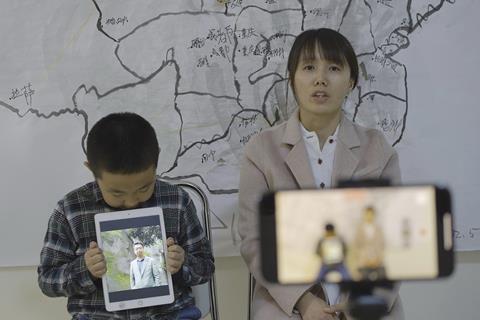Examination of China’s increasingly onerous approach to the surveillance and censorship of its citizens

Dir/scr: Zhang Jialing. Germany/Netherlands. 2023. 97mins
The terrifying thing about the Chinese state’s surveillance culture is not just the way it has harnessed technology – although, as Zhang Jialing’s alarming and exhaustively detailed film makes clear, there is plenty to worry about when it comes to the far-seeing eye of big data. But equally as disquieting is the way censorship and control have been internalised by large swathes of the Chinese population. It’s like the story of the boiling frog, explains journalist Sophia Huang Xueqin. “First they take away small freedoms. If we accept that, they take away more.” Huang is one of three women whose stories Zhang follows in this rigorous, densely detailed film, which gives a sobering view of life within China’s increasingly monitored and closely controlled society.
A thorough overview of China’s multi-pronged assault on the privacy and rights of its populace
Chinese-born, US-based filmmaker Zhang has had her own experience of gaining status as a “person of special interest” to the authorities. Having co-directed the Sundance prize-winning film One Child Nation with Wang Nanfu, Zhang was subsequently placed on police records and now cannot return to China. Like Wang’s most recent film, the Covid-19 documentary In The Same Breath, which Zhang produced, Total Trust was directed remotely. The number of credits that are listed as ‘anonymous’ gives some indication of the risks taken by the activists and filmmakers who served as Zhang’s crew on the ground. The resulting film is incisive, informative and edited with a taut, journalistic sense of story, which should be a title of considerable interest for specialist distributors.
Chen Zijuan has not seen her husband, human rights lawyer Chang Weiping, since he was arrested on January 12, 2020 and charged with “subversion of state power.” It’s a charge, we are told, that has no clear definition, allowing the police to manipulate it to suit their needs. Chen and Chang’s son, Tutu, kisses a cardboard cut-out of his father and curses at the surveillance cameras newly installed outside of his grandparent’s home. Journalist Huang first met Chang when he offered her pro bono legal representation in fighting a libel case linked to a #metoo exposé that she wrote. Now she is covering his case; a decision that has rekindled police interest in her own activities.
Li Wenzu and her son Quanquan have finally been reunited with her lawyer husband Wang Quanzhang, who was arrested during the ’709’ crackdown in 2015 along with more than 300 other human rights lawyers and activists. But life in their Beijing apartment is not easy. Their neighbours have been turned against them – the authorities smeared them as ‘a family of traitors’ – and they frequently find themselves forbidden from leaving their home. Wang’s legal licence has been revoked and, rather than the human rights cases that he used to take on, he is reduced to bidding for jobs settling rural land disputes. The tension between the father and the son he didn’t see for much of the child’s early life is exacerbated by the enforced claustrophobia of their living conditions.
The stories of the three women and their families are set against a thorough overview of China’s multi-pronged assault on the privacy and rights of its populace. Biometric data goes beyond facial recognition technology: Huang explains that, even if she covers her face, her voice could be recognised. Meanwhile, ‘social credit scores’ have been introduced – incentives to encourage the people to surveil and control themselves. In one social credit point system, 300 hours of voluntary work will earn you 50 points. But if you run a red light, you lose 5. If you promulgate rumours online, you lose 20. Extravagance in a wedding or a funeral will also cost 20. And if you dare to petition the central government, the fine is 50 points.
This is Orwellian and overbearing, something that Huang acknowledges: her response to a surveillance camera positioned directly opposite her living room window was to read chapters of ’1984’ to it every day. Eventually, the camera was taken down. But the victory was a temporary one. The closing credits of the film note that Huang, who planned to study in the UK, was arrested on the way to the airport and is now awaiting her trial for that convenient, catch-all charge of “subversion of state power.”
Production company: Film Tank
International sales: Cinephil info@cinephil.com
Producers: Knut Jager, Michael Grotenhoff, Saskia Kress, Jialing Zhang
Cinematography: Anonymous
Editing: Barabara Toennieshen, anonymous
Music: Jorg Gollasch















![[L-R]: Amanda Villavieja, Laia Casanovas, Yasmina Praderas](https://d1nslcd7m2225b.cloudfront.net/Pictures/274x183/6/4/1/1471641_pxl_20251224_103354743_618426_crop.jpg)








